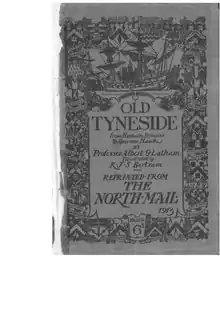
Albert George Latham (1864–1940) was the first Professor of Modern Languages[1] at Newcastle University. He was educated at the Universities of London, Bonn, Caen, Paris and Florence and joined the staff in 1893 as a lecturer in French and Italian. In 1899, he married the daughter of A D Murray, editor of the Newcastle Daily Journal (Mrs Latham later became an author of books for children and also took charge of ‘Children’s Hour’, as ‘Auntie Katie’ in local transmissions for children from the local Newcastle BBC radio station).[2] He was a specialist in French and German literature and also an accomplished translator for several European languages, mainly German, French and Italian, translating, among other things, choral works set by his colleague at Newcastle, W G Whittaker. In 1910/11, he was appointed as the first full professor of Modern Languages,[3] leading to Centenary Celebrations at the School of Modern Languages at Newcastle in 2011.[4] Latham’s publications included The Oxford Treasury of French Literature.[5] His translation of Goethe's Faust for the Everyman's Library edition was the one most English-speaking readers in the first half of the twentieth century would have been familiar with. He retired in 1926.
References
- ↑ "Julian Hatzig : Modern Languages at Newcastle University - A History" (PDF). Ncl.ac.uk. Archived from the original (PDF) on 2012-05-14. Retrieved 2013-11-29.
- ↑ Research in the University Archives by M Christine Borthwick on Albert Latham’s links with W G Whittaker and a brief account of WGW’s career as a music editor with Oxford University Press, April 2011, in celebration of 100 years of Modern Languages Teaching
- ↑ "Students perform play to celebrate School of Modern Languages centenary" (PDF). Ncl.ac.uk. Archived from the original (PDF) on 2013-11-02. Retrieved 2013-11-29.
- ↑ "News - School of Modern Languages - Newcastle University". Ncl.ac.uk. 2011-02-13. Archived from the original on 2013-12-03. Retrieved 2013-11-29.
- ↑ Durham University Journal, Vol. XXIV, No. 8, March 1926